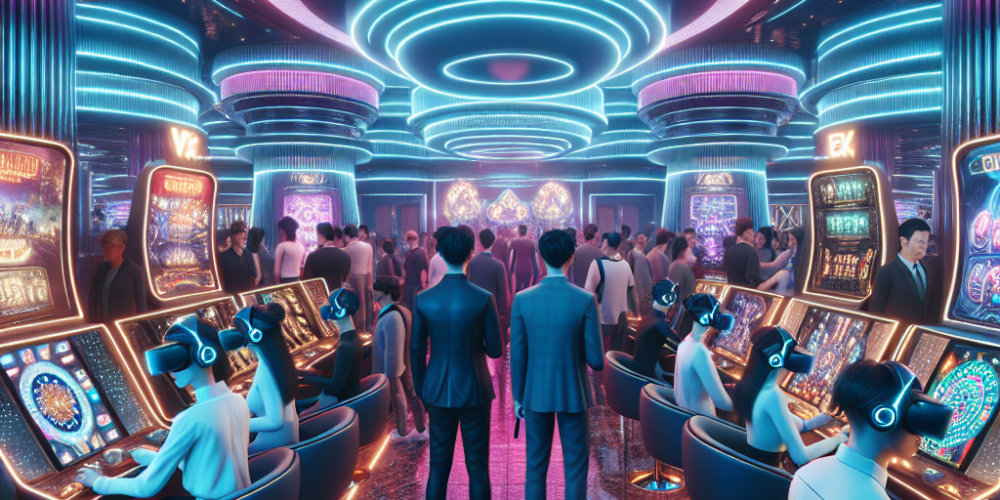In the ever-evolving landscape of gaming, the integration of virtual reality (VR) technology has marked a significant milestone, particularly in the casino industry. As we advance further into the digital age, VR casinos are becoming not just a novelty but a central player in pushing the boundaries of immersive gaming experiences. This new frontier is redefining what it means to “visit” a casino, offering gamers and gamblers alike a way to experience the thrill of the casino floor without ever leaving their homes.
Virtual reality technology in gaming has been around for a few years, primarily focusing on video games that transport players to fully immersive environments. However, its application in the gambling world is relatively recent. The concept of VR casinos is straightforward: using a VR headset, players can enter a fully interactive and immersive digital casino. Inside, everything from the slot machines to the card tables is rendered in vivid detail, mimicking the sensory experiences of a physical venue.
One of the pioneers of this technology, SlotsMillion, launched its VR casino in 2015 and has since seen a steady influx of enthusiasts eager to try their hand at this novel form of gaming. Users can walk around the digital space, interact with other players, and even order virtual drinks. The games themselves are not just visually immersive; they also incorporate sound design that mimics the clinking of coins, the shuffling of cards, and the buzz of excited chatter, enhancing the overall experience.
The advantages of VR casinos extend beyond the novelty factor. For one, they offer accessibility that traditional casinos can’t match. Participants from anywhere in the world can log in and play without the need for travel or accommodation arrangements. This is particularly appealing in today’s environment, where travel can still be unpredictable. Additionally, VR casinos can offer a level of safety and privacy that physical casinos might not. Players can gamble anonymously, without the concerns of carrying cash or interacting in crowded spaces.
From an economic perspective, VR casinos are also an attractive proposition for companies in the gaming industry. The overheads associated with virtual casinos are significantly lower than those of their brick-and-mortar counterparts. There’s no need for large physical spaces, security measures, or a large staff. Furthermore, the scalability of VR platforms means that once the initial software is developed, it can continue to expand and evolve without substantial additional investment.
However, the transition to VR-based casinos is not without challenges. The most significant of these is the technology requirement. To access VR casinos, users must have a VR headset, which can be a barrier due to cost and the need for a reasonably powerful computer. Moreover, as with any online platform, there are concerns regarding security and the fairness of the games. Ensuring that the games are not only immersive but also transparent and fair will be crucial for gaining and maintaining player trust.
Regulation is another critical area. Just like online gambling, VR gambling falls into a gray area in many jurisdictions. Legislators are still catching up with the technology, and the legal landscape varies widely between different regions. Companies operating VR casinos must navigate these waters carefully to avoid running afoul of local laws, which can be a complex and dynamic challenge.
Looking forward, the potential of VR casinos is boundless. Current trends suggest that the industry could lean even more heavily into this technology, especially as VR devices become more accessible to the general public. Innovations could include multiplayer games, more realistic and interactive game environments, and even VR live dealer games, which would simulate playing at a real table. As technology advances, so too will the capacity to deliver a more refined and engaging user experience.
In conclusion, the rise of VR casinos represents a significant shift in both the gaming and gambling industries. As they become more refined and accessible, they promise to offer a compelling blend of convenience, safety, and immersive entertainment. For gamblers and gamers who have long sought a more engaging home gaming experience, the future is here—and it’s virtually real.

David Farbacu is a seasoned writer with a passion for games, gaming, casinos, and Xbox. With a wealth of experience in the industry, David brings insightful reviews, comprehensive guides, and engaging articles that cater to both casual gamers and hardcore enthusiasts. His expertise spans across various gaming platforms and genres, making him a go-to source for the latest trends and developments in the gaming world.

